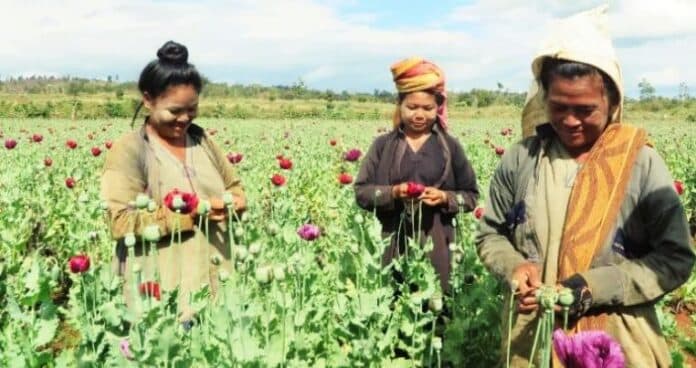Myanmar has claimed the title of the world’s largest opium producer in 2023, surpassing Afghanistan. The shift in rankings follows the Taliban government’s stringent crackdown on opium trade in Afghanistan. According to a recent report by United Nations Office for Drugs and Crime (UNODC), Myanmar’s opium production for the year reached an estimated 1,080 metric tonnes, a significant increase from the previous year’s 790 metric tonnes. Whereas Afghanistan’s opium production saw 95% decrease following the Taliban’s ban on poppy cultivation in April 2022.
The surge paints a concerning picture within the complex tapestry of Myanmar, Laos, and Thailand, known as the “Golden Triangle”. The border region has historically been a hub for illegal drug production and trafficking, particularly involving methamphetamine and opium. This shift, however, is not merely a statistic; it represents a confluence of political instability, economic hardship, and deeply entrenched social issues that necessitate a nuanced and multifaceted approach.
Myanmar’s Poppy Blossoms Amidst Conflict
UNODC highlights that the total estimated value of Myanmar’s “opiate economy” has surged to a range between 1 billion USD and 2.4 billion USD. This constitutes 1.7% to 4.1% of the country’s GDP in 2022. Myanmar’s legal economy has suffered due to conflict and instability since the military seized power in 2021, prompting many farmers to turn to poppy cultivation. Factors such as poor market access, inadequate state infrastructure, and rampant inflation have played a significant role in this shift, as noted in the report.
The UNODC also underscores the increasing sophistication of poppy cultivation in Myanmar, with enhanced investment and practices, including improved irrigation and potential fertilizer use, contributing to higher crop yields. In contrast, Afghanistan, which held the title of the world’s largest producer for several years, witnessed a drastic reduction in poppy cultivation after the Taliban’s commitment to eradicating illegal drug production.
Opium Surge Threatens Regional Stability
Myanmar’s opium cultivation is primarily concentrated in the Shan State, nestled amidst the rugged mountains bordering Thailand and Laos. This region has grappled with ethnic insurgencies for decades, creating a fertile ground for poppy cultivation. The breakdown of law and order in the wake of the 2021 military coup has further worsened the situation.
Shan state covers almost a quarter of Myanmar’s land mass. It is known for its ravines and jungle-clad hills. UN identifies it as Southeast Asia’s primary source of methamphetamine.
Due to ongoing turmoil, ethnic minority armed groups have launched an offensive against the junta and its allies. Moreover, rebel groups and criminal networks who profit from the illicit opium trade have also been emboldened. Myanmar’s increased opium output threatens to exacerbate this issue, fueling addiction, crime, and social instability across the region.
Opium is essentially the “Green Gold” for those suffering economic hardships. Poverty, particularly in rural areas, incentivizes farmers to turn to poppy cultivation, as its returns far outpace other agricultural options. This dependence on the opium trade creates a vicious cycle, trapping farmers in debt and perpetuating the cycle of poverty and violence.
Is There a Brighter Future for Golden Triangle?
Cultivation has also seen an uptick in northern Kachin state and Chin state on the border with India, according to the UN report. Analysts express skepticism about the military’s commitment to ending the multi-billion dollar trade, pointing to the military’s ousting of an elected government in 2021 and its seizure of power. In a rare admission earlier this year, the head of Myanmar’s Central Committee on Drug Abuse Control acknowledged that efforts to curb the trade were proving ineffective.
Addressing this complex crisis demands a multi-pronged approach. An inclusive and peaceful resolution to the ongoing conflict is crucial to restoring law and order and creating an environment conducive to development.
Providing alternative livelihoods and supporting sustainable agricultural practices are crucial steps towards breaking the dependence on opium. This requires international cooperation and investment in infrastructure, education, and rural development projects. Investing in addiction treatment programs, harm reduction strategies, and public education campaigns can mitigate the devastating impact of opium on individuals and communities.
By fostering peace, promoting development, and prioritizing public health, Golden Triangle can shine not for its illicit crops, but for its vibrant communities and sustainable prosperity.


